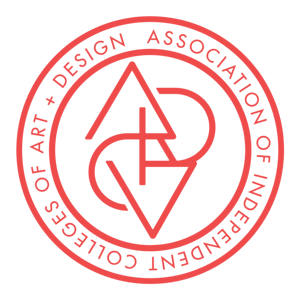The Association of Independent Colleges of Art & Design and NOAA Fisheries have announced the placement of Catherine Ross into the fourth AICAD/NOAA Fisheries Art + Science Fellowship. The fellowship seeks ways to broaden engagement in fisheries management.
Catherine Ross is a researcher, creative technologist, and sound artist whose practice is centered in social and environmental justice as they relate to burgeoning technologies. Their work finds form in virtual and augmented reality, spatialized sound design, 3D environmental design and animation, data visualization, and live performance. Catherine is co-founder of Love Death Design, a remote creative studio developing immersive experiences to challenge systemic injustice and raise awareness around environmental issues. A graduate from Pacific Northwest College of Art in Intermedia Arts, their work includes features across various virtual platforms and collaborations with Oregon Museum of Science and Industry, EYEBEAM, Portland Institute of Contemporary Art, Pacific Works NW, Center of Contemporary Art and Culture, Place Galley, and Indivisible Gallery.
The AICAD/NOAA Fisheries Art + Science Fellowship provides a hands-on opportunity for a recent graduate to apply their art and design education to ecological and social concerns and address them by connecting communities around challenging resource issues. Catherine will complete a 6-week residency with NOAA Fisheries during summer 2023, and then will research, produce, and distribute creative work through February 2024.
The 2023 fellowship will focus on imagining ways to identify and engage recreational and subsistence fishing communities affected by federal fisheries management. The work seeks to ensure that those sometimes-overlooked communities have a voice in the decision-making process, and help the agency allocate its services in equitable ways.
That goal aligns with a national Equity and Environmental Justice Strategy that NOAA Fisheries adopted earlier this year. The strategy seeks to ensure that West Coast communities have equal access to the sustainable fisheries, safe seafood, and healthy ecosystems NOAA Fisheries strives for.
The selection committee was comprised of artists and NOAA Fisheries professionals, including:
Mickey L.D. Morgan: Mickey is a visual and community practice artist and a care worker. They are passionate about neighborliness, believing that every human and non-human part of an ecosystem are essential to all of our lives. In 2021, Mickey graduated from Emily Carr University of Art and Design majoring in Visual Arts with a minor in Social Practice and Community Engagement, and was 2022’s Art + Science Fellow.
Arlene Birt: Arlene is a visual storyteller, speaker, educator, and public artist. Birt is founder and creative director of Background Stories, an infodesign consultancy that translates complex ideas, systems, and metrics into clear visuals to help people understand social and environmental topics. As Professor in Creative Entrepreneurship at the Minneapolis College of Art and Design, Birt teaches courses on infodesign, data visualization, arts entrepreneurship, and sustainability.
Hugh Pocock: Born in New Zealand and raised in the United States, England and New Zealand, Hugh’s work seeks as a location the points of transaction between culture and natural phenomena. The history and metaphor of the human relationship to natural resources, space, time, consumerism, art, and language are among the issues Pocock investigates in his sculptures, installations and videos.
Daniel Studt: Daniel has been the recreational fisheries coordinator with NOAA Fisheries’ West Coast Region since 2019. He works on various projects with federal, state, and local partners related to recreational fisheries management, data collection, and outreach and education. He especially enjoys his time getting out into the fishing community presenting to local clubs, holding roundtables, and hosting a NOAA booth at various fishing shows.
Matt Burks: Matt is a public affairs officer with NOAA Fisheries West Coast Region. He has worked in natural resources management and science communications since 2011. Before that he was a wildland firefighter. Matt made the transition from firefighter to communications specialist one afternoon when he wrote a press release about Smokey Bear while sitting in the back of his pickup truck.


